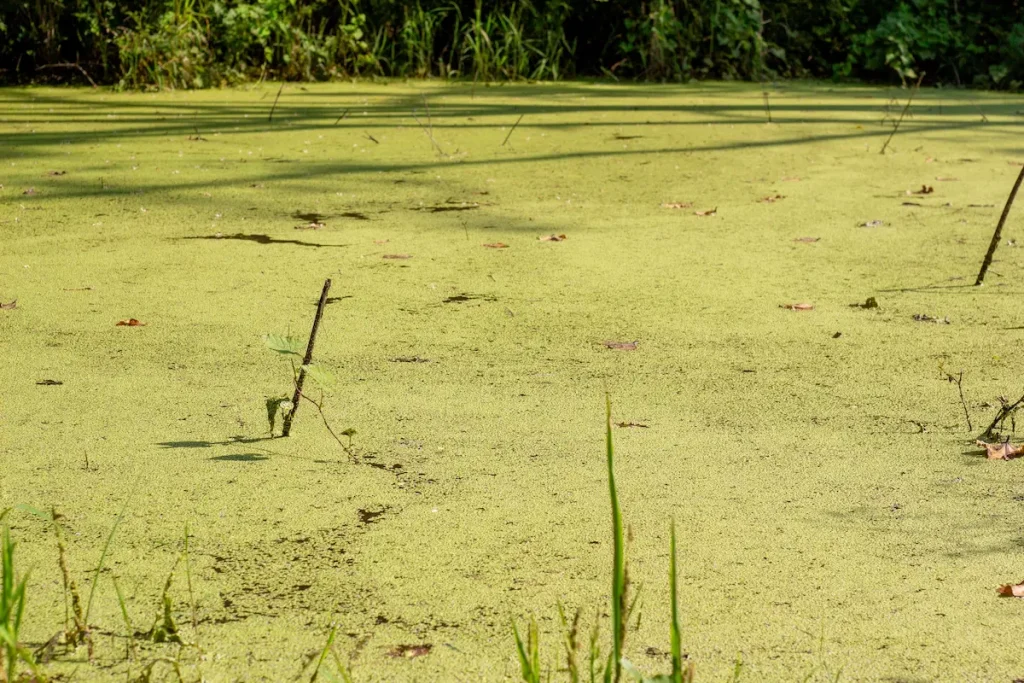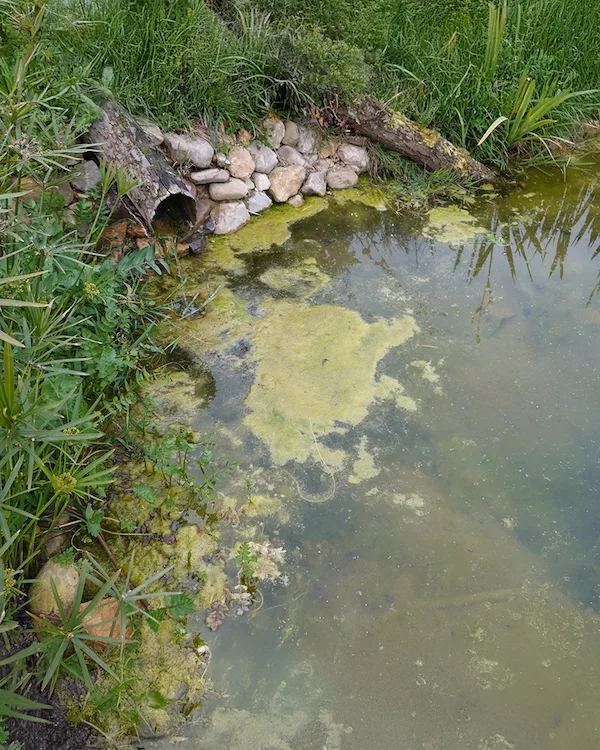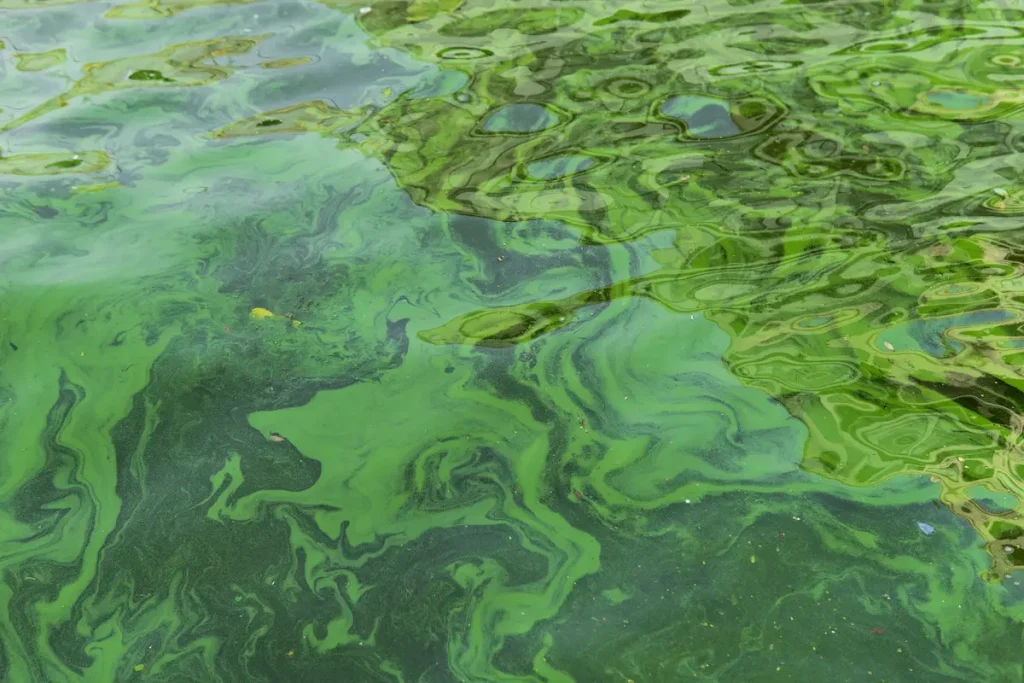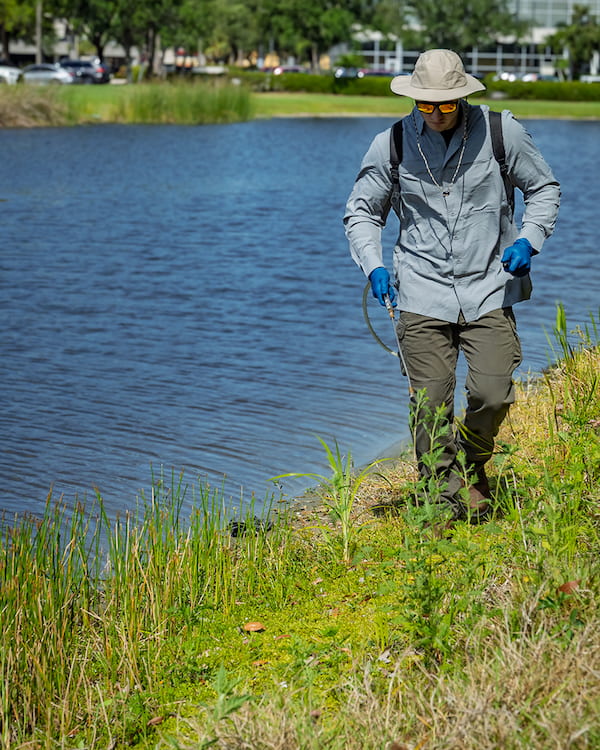How Does Nutrient Overloading Affect Lake Water Quality?
How Does Nutrient Overloading Affect Lake Water Quality?

Clear, healthy lakes and ponds don’t happen by accident. One of the biggest threats to lake water quality today is nutrient overload which is a form of pollution that’s invisible at first but leads to serious and visible consequences like algae blooms, murky water, and declining fish populations.
Whether you manage a private estate, HOA, golf course, or commercial property with a water feature, understanding what causes nutrient overloads in a lake and how to prevent it is key to sustainable pond management. In this article, we’ll explain how excess nutrients degrade water quality, what to watch for, and when to call Pond Guru for help.
What Is Nutrient Overload?
Nutrient overload (also known as nutrient water pollution) occurs when excessive levels of nitrogen and phosphorus enter a body of water. While nutrients are essential for aquatic life, too much disrupts the natural balance of a lake or pond.
What Causes Nutrient Overloads in a Lake?
Understanding the sources of nutrient pollution is the first step in protecting your lake.

Common sources include:
- Fertilizer runoff from lawns, golf courses, or nearby agriculture
- Pet and wildlife waste, which adds nitrogen and phosphorus to the water
- Decomposing leaves and organic matter accumulating on the bottom
- Failing septic systems leaching nutrients into surrounding water
- Overfeeding fish or having a high fish population without enough filtration
Once nutrients build up, they trigger excessive algae growth, plant overgrowth, and low oxygen levels; all of which lead to poor lake water quality.
What Happens When There Is Too Much Nutrients in the Water?
If you’re asking, “what happens when there is too much nutrients in the water?”, here’s a breakdown of the key effects:
1. Algae Blooms
Phosphorus feeds algae. Even a small excess can lead to explosive growth of planktonic or filamentous algae. These blooms reduce water clarity, block sunlight, and make the pond look green or slimy.
2. Oxygen Depletion
When algae dies, it sinks and decomposes; consuming large amounts of oxygen in the process. This leads to hypoxia (low oxygen), which stresses or kills fish.
3. Excessive Aquatic Weeds
Nutrient-rich water encourages invasive weeds to take over, making maintenance more difficult and recreational use less enjoyable.
4. Fish Kills and Imbalanced Ecosystems
A pond or lake under nutrient stress can’t support a balanced fish population. You’ll see fewer game fish, more bottom-feeders, and increased risk of fish kills in the summer.
Clean Your Lake with Pond Guru!
Schedule an appointment for a site visit with our lake management team.
How Nutrient Overloading Affects Lake Water Quality
The overall impact of nutrient overloading is a cascade of negative changes:
- Cloudy, green, or foul-smelling water
- Increase in mosquitoes and unwanted pests
- Fish stress and mortality
- Unattractive or unusable water features
- Increased costs for algae and weed treatment
Left unchecked, nutrient pollution can permanently alter the aquatic environment, making recovery much more difficult.

How to Prevent Nutrient Overloading in Lake Water
Fortunately, there are smart, science-based ways to reduce nutrient loading and protect your pond’s health.
1. Reduce Fertilizer Use Near Water
Apply only slow-release or organic fertilizers and never apply before heavy rain. Use buffer zones (plants or rocks) to prevent runoff from entering the water.
2. Install Aeration Systems
Aerators improve water circulation and oxygen levels, helping to break down nutrients before they cause a problem.
3. Use Beneficial Bacteria
Biological treatments can outcompete algae and break down organic sludge that releases nutrients.
4. Maintain Healthy Shorelines
Planting native grasses and wetland plants helps filter runoff before it reaches the lake.
5. Skim and Remove Debris
Regularly remove leaves, grass clippings, and decaying organic material from the surface and bottom of the pond.
Why Work With Professional Lake Management Services?
If you’re dealing with murky water, rapid weed growth, or constant algae blooms, DIY solutions may not be enough. Partnering with lake management services like Pond Guru gives you access to professional tools and deep expertise.
What Pond Guru Offers:
- On-site water testing and nutrient diagnostics
- Algae and weed species identification
- Custom management plans for nutrient control
- Safe biological and chemical treatments
- Ongoing monitoring and maintenance
Our team helps HOAs, golf courses, and private landowners restore their ponds and prevent nutrient overload before it starts.

Schedule a Site Visit with Pond Guru
At Pond Guru, we specialize in diagnosing and solving complex pond management problems, including nutrient overloading and its impact on lake water quality.
If you’re noticing increased algae, cloudy water, or declining fish health, it’s time to schedule a professional site visit. We’ll inspect your pond or lake, identify what’s causing the issue, and recommend the safest, most effective path forward.
Frequently Asked Questions
Common causes include fertilizer runoff, decaying debris, pet waste, and overstocked fish populations.
It leads to algae blooms, low oxygen levels, poor water clarity, and fish stress or death.
Yes, with the right lake management services, including aeration, shoreline buffers, and biological treatments.
The safest approach involves prevention, regular testing, beneficial bacteria treatments, and professional guidance.
If your pond or lake has recurring algae, weed overgrowth, or cloudy water, it’s time to schedule a site visit with Pond Guru for evaluation.
Ready to Schedule a Visit ?
Have questions about your pond or lake? Our experts are ready to help you take the next step.
Latest Article
Popular Post
What Is Filamentous Algae? Pond Management
Filamentous algae, often referred to as “pond scum,” “string algae,”…

Clear, healthy lakes and ponds don’t happen by accident. One of the biggest threats to lake water quality today is nutrient overload which is a form of pollution that’s invisible at first but leads to serious and visible consequences like algae blooms, murky water, and declining fish populations.
Whether you manage a private estate, HOA, golf course, or commercial property with a water feature, understanding what causes nutrient overloads in a lake and how to prevent it is key to sustainable pond management. In this article, we’ll explain how excess nutrients degrade water quality, what to watch for, and when to call Pond Guru for help.
What Is Nutrient Overload?
Nutrient overload (also known as nutrient water pollution) occurs when excessive levels of nitrogen and phosphorus enter a body of water. While nutrients are essential for aquatic life, too much disrupts the natural balance of a lake or pond.
What Causes Nutrient Overloads in a Lake?
Understanding the sources of nutrient pollution is the first step in protecting your lake.

Common sources include:
- Fertilizer runoff from lawns, golf courses, or nearby agriculture
- Pet and wildlife waste, which adds nitrogen and phosphorus to the water
- Decomposing leaves and organic matter accumulating on the bottom
- Failing septic systems leaching nutrients into surrounding water
- Overfeeding fish or having a high fish population without enough filtration
Once nutrients build up, they trigger excessive algae growth, plant overgrowth, and low oxygen levels; all of which lead to poor lake water quality.
What Happens When There Is Too Much Nutrients in the Water?
If you’re asking, “what happens when there is too much nutrients in the water?”, here’s a breakdown of the key effects:
1. Algae Blooms
Phosphorus feeds algae. Even a small excess can lead to explosive growth of planktonic or filamentous algae. These blooms reduce water clarity, block sunlight, and make the pond look green or slimy.
2. Oxygen Depletion
When algae dies, it sinks and decomposes; consuming large amounts of oxygen in the process. This leads to hypoxia (low oxygen), which stresses or kills fish.
3. Excessive Aquatic Weeds
Nutrient-rich water encourages invasive weeds to take over, making maintenance more difficult and recreational use less enjoyable.
4. Fish Kills and Imbalanced Ecosystems
A pond or lake under nutrient stress can’t support a balanced fish population. You’ll see fewer game fish, more bottom-feeders, and increased risk of fish kills in the summer.
Clean Your Lake with Pond Guru!
Schedule a appointment for a site visit with our lake management team.
How Nutrient Overloading Affects Lake Water Quality
The overall impact of nutrient overloading is a cascade of negative changes:
- Cloudy, green, or foul-smelling water
- Increase in mosquitoes and unwanted pests
- Fish stress and mortality
- Unattractive or unusable water features
- Increased costs for algae and weed treatment
Left unchecked, nutrient pollution can permanently alter the aquatic environment, making recovery much more difficult.

How to Prevent Nutrient Overloading in Lake Water
Fortunately, there are smart, science-based ways to reduce nutrient loading and protect your pond’s health.
1. Reduce Fertilizer Use Near Water
Apply only slow-release or organic fertilizers and never apply before heavy rain. Use buffer zones (plants or rocks) to prevent runoff from entering the water.
2. Install Aeration Systems
Aerators improve water circulation and oxygen levels, helping to break down nutrients before they cause a problem.
3. Use Beneficial Bacteria
Biological treatments can outcompete algae and break down organic sludge that releases nutrients.
4. Maintain Healthy Shorelines
Planting native grasses and wetland plants helps filter runoff before it reaches the lake.
5. Skim and Remove Debris
Regularly remove leaves, grass clippings, and decaying organic material from the surface and bottom of the pond.
Why Work With Professional Lake Management Services?
If you’re dealing with murky water, rapid weed growth, or constant algae blooms, DIY solutions may not be enough. Partnering with lake management services like Pond Guru gives you access to professional tools and deep expertise.
What Pond Guru Offers:
- On-site water testing and nutrient diagnostics
- Algae and weed species identification
- Custom management plans for nutrient control
- Safe biological and chemical treatments
- Ongoing monitoring and maintenance
Our team helps HOAs, golf courses, and private landowners restore their ponds and prevent nutrient overload before it starts.

Schedule a Site Visit with Pond Guru
At Pond Guru, we specialize in diagnosing and solving complex pond management problems, including nutrient overloading and its impact on lake water quality.
If you’re noticing increased algae, cloudy water, or declining fish health, it’s time to schedule a professional site visit. We’ll inspect your pond or lake, identify what’s causing the issue, and recommend the safest, most effective path forward.
Frequently Asked Questions
Common causes include fertilizer runoff, decaying debris, pet waste, and overstocked fish populations.
It leads to algae blooms, low oxygen levels, poor water clarity, and fish stress or death.
Yes, with the right lake management services, including aeration, shoreline buffers, and biological treatments.
The safest approach involves prevention, regular testing, beneficial bacteria treatments, and professional guidance.
If your pond or lake has recurring algae, weed overgrowth, or cloudy water, it’s time to schedule a site visit with Pond Guru for evaluation.
Ready to Schedule a Visit ?
Have questions about your pond or lake? Our experts are ready to help you take the next step.
Latest Article
Popular Post
What Is Filamentous Algae? Pond Management
Filamentous algae, often referred to as “pond scum,” “string algae,”…

